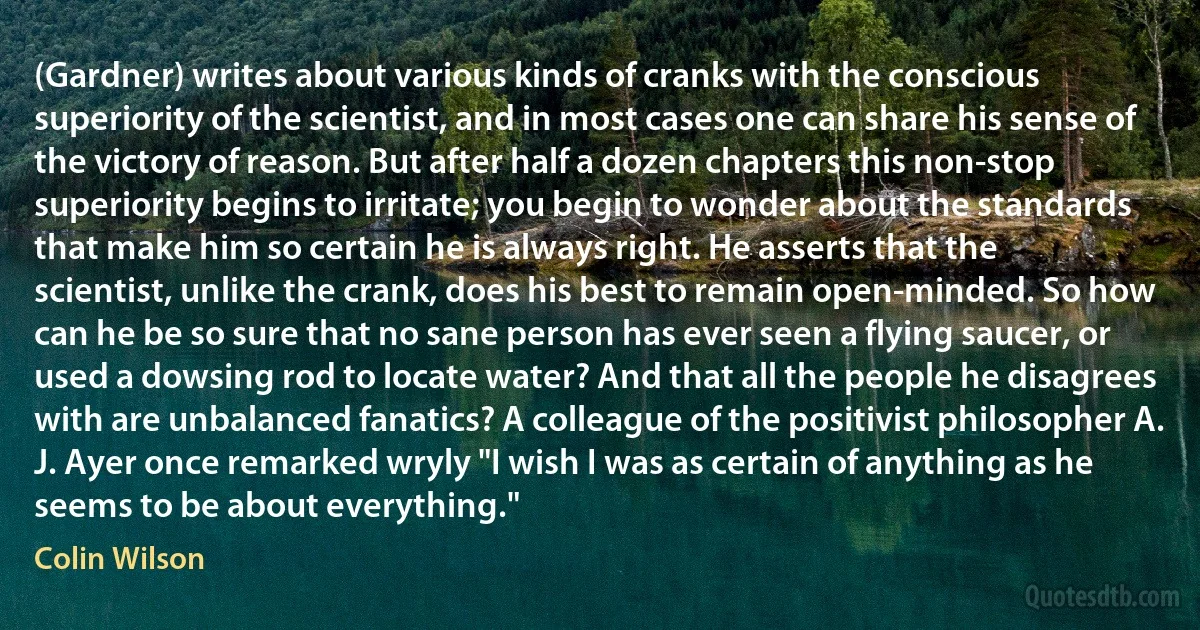
(Gardner) writes about various kinds of cranks with the conscious superiority of the scientist, and in most cases one can share his sense of the victory of reason. But after half a dozen chapters this non-stop superiority begins to irritate; you begin to wonder about the standards that make him so certain he is always right. He asserts that the scientist, unlike the crank, does his best to remain open-minded. So how can he be so sure that no sane person has ever seen a flying saucer, or used a dowsing rod to locate water? And that all the people he disagrees with are unbalanced fanatics? A colleague of the positivist philosopher A. J. Ayer once remarked wryly "I wish I was as certain of anything as he seems to be about everything."
Colin WilsonRelated topics
anything begin best certain colleague crank dozen everything flying half once people person positivist reason remain right rod saucer seen sense share sure victory water wish wonder non-stopRelated quotes
If we refuse...what are the prospects? Repression, and nothing but repression, and it is a very uncomfortable repression; a kind of repression from which we shall get neither credit nor success. It is the repression of the masses of the people, the great proportion of these masses being women and children. It is the repression not of organisations and not of bodies; it will develop into the repression of the whole of the population. ... If, on the other hand, you wish to bind India to you by bonds of confidence, to make her happy within your Empire and Commonwealth, if you wish to hear her praise you in gratitude and remain with you in pride, then accept the work that has been done by the Conference, and instruct the Government to proceed with it to a complete conclusion.

Ramsay MacDonald
I think we've been through a period where too many people have been given to understand that if they have a problem, it's the government's job to cope with it. 'I have a problem, I'll get a grant.' 'I'm homeless, the government must house me.' They're casting their problem on society. And, you know, there is no such thing as society. There are individual men and women, and there are families. And no government can do anything except through people, and people must look to themselves first. It's our duty to look after ourselves and then, also to look after our neighbour. People have got the entitlements too much in mind, without the obligations. There's no such thing as entitlement, unless someone has first met an obligation.

Margaret Thatcher
The worst thing that can happen to advanced devotees who are fixed in Krishna consciousness is that they will go back to the spiritual world. Thus, they are enabled by calamitous situations to go back to Krishna more quickly. It is a part of the process of devotion that from time to time everyone must be tested in various ways. When we take to devotional service we are declaring war against Maya. We are on a battlefield, engaged in our own battle of Kuruksetra. We shouldn't read the Bhagavad-gita and think that it is merely some fascinating ancient history and philosophy. We should also understand that Arjuna is representing every person who is trying to take shelter of Krishna. Arjuna had to undergo bewilderment and serious choices, but Krishna was present to protect him.

Bhakti Tirtha Swami
The best educators are the ones that inspire their students. That inspiration comes from a passion that teachers have for the subject they're teaching. Most commonly, that person spent their lives studying that subject, and they bring an infectious enthusiasm to the audience. I think many people have that enthusiasm, but they are prevented from being teachers because they didn't go through the teacher mill. Now you have teachers who have been through the teacher mill, yet they have no capacity to inspire anyone at all. It's the inspired student that continues to learn on their own. That's what separates the real achievers in the world from those who pedal along, finishing assignments.

Neil deGrasse Tyson
As Ralph Ellison wrote more than 35 years ago, 'Why is it so often true that when critics confront the American as Negro, they suddenly drop their advanced critical armament and revert with an air of confident superiority to quite primitive modes of analysis?' Those matters accomplished by whites are routinely subjected to sophisticated modes of analysis. But the when the selfsame matters are accomplished by blacks, the opaque racial prism of analysis precludes such sophistication, and all is seen in black and white. And some who would not venture onto the more sophisticated analytical turf are quite content to play in the minor leagues of primitive harping. The more things change, the more they remain the same.

Clarence Thomas
